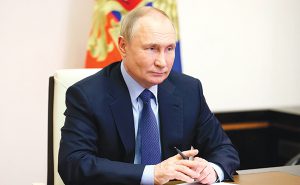Vladimir Putin’s attack on Ukraine showed the world that a resurgent Russia means, of necessity, an imperialist Russia. And it revived discussions about whether Russia needs to be “decolonised,†or perhaps “defederalised,†to bury its imperialist ambitions and subdue its military threat. A breakup of today’s Russia, similar to the dissolution of the Soviet Union, is seen as a possible, for some even the most desirable, outcome of a failed Ukraine invasion. Regrets are voiced that the
US didn’t make it a goal in the 1990s, when post-Soviet Russia lay in ruins and struggled to hold onto one, tiny secessionist region: Chechnya.
These discussions bring on a sense of literary deja-vu — a Russia turned into a quilt of statelets has been almost too easy to imagine since the Soviet Union came apart with such seeming ease. In the 2013 novel “Telluria,†Vladimir Sorokin, one of the most uncannily precise prophets of Russia’s turn to fascism, had one of the characters write of the Russian empire.
If she, this splendidly ruthless giantess in her diamond diadem and her snow mantle, collapsed conveniently in February, 1917, and disintegrated into several states of manageable size, everything would have turned out in the spirit of modern history, and the peoples held down by czarist power finally would have come into possession of their post-imperial identities and lived in freedom. But that’s not how it went.
In “Telluria,†Russia is finally split into mostly autocratic principalities of “manageable size†after a series of domestic shake-ups. Not even Sorokin saw a lost war of invasion as a trigger for a breakup of Russia.
And yet a defeat in Ukraine, accompanied by Western economic pressure, could realistically lead to an economic disaster like the one that set off the Soviet Union’s collapse, and could thus strengthen the centrifugal tendencies that Putin is so proud of having stifled by establishing his “vertical of power.â€
There are good reasons why it might make sense even for the Russian people — especially those who do not live in Central Russia.
In a way, Putin hasn’t just unleashed the breakup discussion by his irrational attack. He has also enabled it intellectually by talking of “historical Russia,†which in his view includes much of modern Ukraine. If it’s possible to discuss a core Russian state, rather than the country in its current borders, then it can be argued that this core is in fact much smaller than today’s Russia — if one peels off all the country’s imperial conquests, some of which, including the takeover of much of Siberia, predate 1721, when Russia officially became an empire.
In a way, the inclusion of some territories in the Russian Soviet Socialist Republic — the entity that became the Russian Federation when the Soviet Union gave up the ghost — is as much a Soviet-era accident as the higher-grade statehood of ex-Soviet republics such as Ukraine, Uzbekistan or Moldova.
Tatarstan, the populous Russian region on the Volga, is a case in point. Last year, 55% of schoolchildren in its capital, Kazan, chose Tatar as their native language. Is this place, conquered by Ivan the Terrible in 1552, really part of core Russia in any more meaningful way than, say, Kazakhstan was? Many locals would argue otherwise.
Is Tuva, which joined the Soviet Union only in 1944 and lived through separatist riots in the early 1990s, part of Russia’s historical core? Is Dagestan, conquered in the early 19th century, where fewer than 4% of schoolchildren take Russian as
native language classes? Wouldn’t all of these places have been independent states today had the Communist founders of the Soviet Union constituted them as “union republics†rather than “autonomous republics†within Russia?
All these questions are fodder for the policy makers of Russia’s geopolitical rival nations. Fomenting nationalist (or anti-colonial, as it can be framed) sentiment in a Russia weakened by a less-than-successful war would make sense on several levels — more sense than in the 1990s. An aggressive, irrational leader finding his way to the top in Moscow is no longer a theoretical danger; it’s easy to see how it can happen again. The best way to guard against that possibility is to defeat Putin both militarily and ideologically. By using the same kind of historical talking points that Putin uses to justify Russia’s imperial ambitions, it would be possible to turn his main ideological weapon against him. At the same time, the Ukraine campaign so far shows that the Russian military struggles to supply its troops and fight effectively across Ukraine’s vast expanse. What would Putin do with multiple secessionist rebellions in a country as enormous as Russia?
It could be argued that splintering Russia would not really remove its revanchist ability to pick itself up after bad defeats and major territorial losses — and become a threat to its rivals again. It did so after the Bolshevik Revolution and the punishing Treaty of Brest-Litovsk with the Central Powers, and it did so again after the Soviet project wound down. A Russia dismembered will not necessarily stay that way; extreme nationalist and populist forces may even be empowered by such a humiliation, and they will inherit Russia’s nuclear arsenal, which won’t simply disappear even if Russia disintegrates.
But those who entertain the “decolonisation†of Russia aren’t necessarily thinking centuries ahead. A couple of decades might be enough to integrate Russia’s neighbors into the Western world and build stronger defenses against further imperialist resurgence.
—Bloomberg
Leonid Bershidsky formerly Bloomberg Opinion’s Europe columnist, is a member of the Bloomberg News Automation Team. He recently published Russian translations of George Orwell’s “1984†and Franz Kafka’s “The Trialâ€
 The Gulf Time Newspaper One of the finest business newspapers in the UAE brought to you by our professional writers and editors.
The Gulf Time Newspaper One of the finest business newspapers in the UAE brought to you by our professional writers and editors.

